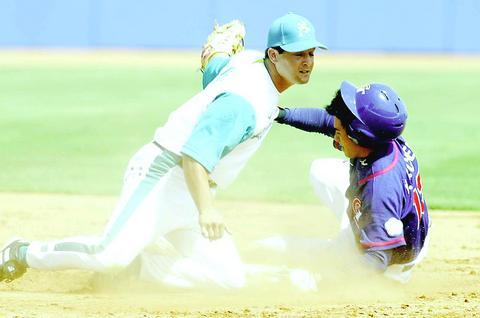Team Taiwan defeated Australia 3-0 yesterday in preliminary round matches at the 2004 Athens Olympic games, keeping Taiwan's hopes of entering the quarterfinals alive
Taiwan's second game in Athens was at the Olympic Baseball Center 2 in the Helliniko Sport Complex -- a very crude and rough stadium where fans have to suffer either scorching sunshine or strong wind, beginning at 10:30am.

PHOTO: LIN CHENG-KUNG, TAIPEI TIMES
Australia sent its best pitcher as the starter, John Stephens, who plays on the Red Sox's triple A team in the US, as starter while Taiwan began with Wang Chieh-ming (王建民), who plays in Yankees' triple A team.
Wang was obviously in great condition because his fastball reached 154kph and successfully struck out Australia's batters.
Compared to their poor batting performance in their 7-0 loss to Canada in their Athens debut, Taiwan's players got four hits off Stephens in the first three innings -- three singles, one double -- to take a 2-0 lead.
In the third inning, Chen Yung-chi (陳鏞基) scored the team's first run on a hit by Huang Chung-yi (黃忠義) and an error by Australia third baseman Glenn Williams. Chen Chih-yuan (陳致遠) scored the second run off a single by Peng Cheng-min (彭政閩).
Both teams were suppressed by pitchers from the fourth to the eighth innings.
Brett Roneberg hit a single in the sixth inning while Chen Yung-chi and Chen Chin-feng (陳金鋒) hit singles in the fifth and sixth innings.
At the top of eighth inning, Chen Chih-yuan hit a single and stole second. Thanks to an error by center fielder Trent Oeltjen on a fly ball from Peng Cheng-min, Chen Chih-yuan scored Taiwan's third run.
Australia immediately replaced Stephens with Richard Thompson, who struck out Taiwan's best batter -- Chen Chin-feng.
Head coach Hsu Sheng-ming (徐生明) sent Tsao Chin-hui (曹錦輝), the country's most famous baseball player who now plays in the US major leagues for the Colorado Rockies, to serve as closer in the eighth inning.
Tsao easily controlled the final innings with his fastball. Taiwan had eight hits and two errors while Australia had five hits, one error.
Taiwan's team still has to face the Netherlands, Italy and Greece in the preliminary session.
"Team Cuba and Team Japan have both been defeated by team Taiwan before," said sport commentator Tseng Wen-cheng (曾文誠). "We only hope that Taiwan can enter the final four and revenge themselves against Canada."
The team lost their first game to Canada on Sunday due to poor defense -- four errors -- and poor batting -- only six hits.
"Actually there were a total of seven errors," said Tseng Wen-cheng, adding "Taiwan's athletes seemed to underestimate Canada's defense ability, and made inappropriate advances and were tagged out three times ... those should be regarded as another three errors."
"We were too nervous to mess up our morale," said Chang Chih-chia after the Canada match. "I am confident that I will win a game soon."
He was proved right yesterday.
Also see story:

Conflict with Taiwan could leave China with “massive economic disruption, catastrophic military losses, significant social unrest, and devastating sanctions,” a US think tank said in a report released on Monday. The German Marshall Fund released a report titled If China Attacks Taiwan: The Consequences for China of “Minor Conflict” and “Major War” Scenarios. The report details the “massive” economic, military, social and international costs to China in the event of a minor conflict or major war with Taiwan, estimating that the Chinese People’s Liberation Army (PLA) could sustain losses of more than half of its active-duty ground forces, including 100,000 troops. Understanding Chinese

The Ministry of Foreign Affairs (MOFA) yesterday said it is closely monitoring developments in Venezuela, and would continue to cooperate with democratic allies and work together for regional and global security, stability, and prosperity. The remarks came after the US on Saturday launched a series of airstrikes in Venezuela and kidnapped Venezuelan President Nicolas Maduro, who was later flown to New York along with his wife. The pair face US charges related to drug trafficking and alleged cooperation with gangs designated as terrorist organizations. Maduro has denied the allegations. The ministry said that it is closely monitoring the political and economic situation

‘SLICING METHOD’: In the event of a blockade, the China Coast Guard would intercept Taiwanese ships while its navy would seek to deter foreign intervention China’s military drills around Taiwan this week signaled potential strategies to cut the nation off from energy supplies and foreign military assistance, a US think tank report said. The Chinese People’s Liberation Army (PLA) conducted what it called “Justice Mission 2025” exercises from Monday to Tuesday in five maritime zones and airspace around Taiwan, calling them a warning to “Taiwanese independence” forces. In a report released on Wednesday, the Institute for the Study of War said the exercises effectively simulated blocking shipping routes to major port cities, including Kaohsiung, Keelung and Hualien. Taiwan would be highly vulnerable under such a blockade, because it

UNRELENTING: China attempted cyberattacks on Taiwan’s critical infrastructure 2.63 million times per day last year, up from 1.23 million in 2023, the NSB said China’s cyberarmy has long engaged in cyberattacks against Taiwan’s critical infrastructure, employing diverse and evolving tactics, the National Security Bureau (NSB) said yesterday, adding that cyberattacks on critical energy infrastructure last year increased 10-fold compared with the previous year. The NSB yesterday released a report titled Analysis on China’s Cyber Threats to Taiwan’s Critical Infrastructure in 2025, outlining the number of cyberattacks, major tactics and hacker groups. Taiwan’s national intelligence community identified a large number of cybersecurity incidents last year, the bureau said in a statement. China’s cyberarmy last year launched an average of 2.63 million intrusion attempts per day targeting Taiwan’s critical